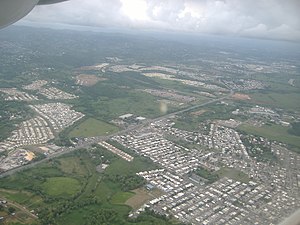Canóvanas, Puerto Rico
| Canóvanas, Puerto Rico | ||
|---|---|---|
| Municipality | ||

Aerial view of PR-3 passing through Canóvanas
|
||
|
||
| Nickname(s): "Pueblo Valeroso", "Ciudad de los Indios", "La Ciudad de las Carreras", "El Pueblo del Chupacabras" | ||
| Anthem: "Canóvanax" | ||
 Location of Canóvanas in Puerto Rico |
||
| Coordinates: 18°22′45″N 65°54′05″W / 18.37917°N 65.90139°WCoordinates: 18°22′45″N 65°54′05″W / 18.37917°N 65.90139°W | ||
| Country | United States | |
| Territory | Puerto Rico | |
| Founded | 1909 | |
| Government | ||
| • Mayor | Lornna Soto (PNP) | |
| • Senatorial dist. | 8 - Carolina | |
| • Representative dist. | 37, 38 | |
| Area | ||
| • Total | 28.23 sq mi (73.12 km2) | |
| • Land | 28 sq mi (73 km2) | |
| • Water | 0.05 sq mi (.12 km2) | |
| Population (2010) | ||
| • Total | 47,648 | |
| Demonym(s) | Canovanenses | |
| Time zone | AST (UTC-4) | |
| Zip code | 00729 | |
Canóvanas (Spanish pronunciation: [kaˈnoβanas]) is a municipality in Puerto Rico, located in the northeastern region, north of Juncos and Las Piedras; south of Loíza; east of Carolina; and west of Río Grande. Canóvanas is spread over 7 wards and Canóvanas Pueblo (The downtown area and the administrative center of the city). It is part of the San Juan-Caguas-Guaynabo Metropolitan Statistical Area.
The region of what is now Canóvanas belonged to the Taíno region of Cayniabón, which stretched from the northeast coast of Puerto Rico into the central region of the island. The region was led by cacique Canobaná-from which the actual name is derived-, in the south half, and female Cacica Loaiza in the north (coastal portion). During the Spanish colonization, the region of Canóvanas was granted to Miguel Díaz, who turned the Taíno "yucayeque" into a ranch. It is said that Canóbana, along with Loaiza, were supporters of the Spanish regime and didn't join the Taino rebellion of 1511.
Canóvanas was a "barrio" (ward) of Loíza for over 400 years. In 1902, the Legislative Assembly of Puerto Rico approved a law for the consolidation of certain municipalities. As a result, both Canóvanas and Loíza were incorporated to the town of Río Grande. However, in 1905 a new law revoked the previous one, returning Canóvanas to its previous state as a "barrio" of Loíza.
...
Wikipedia

